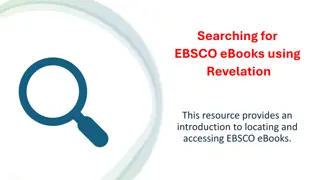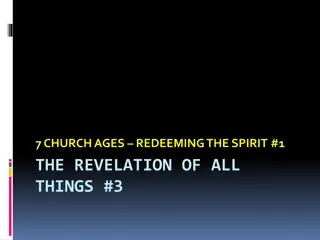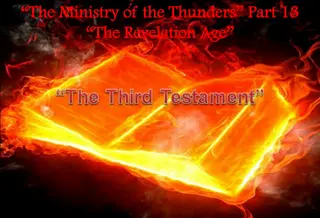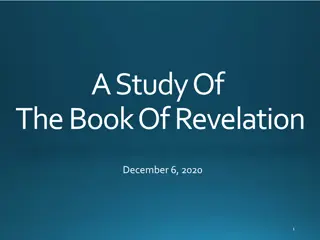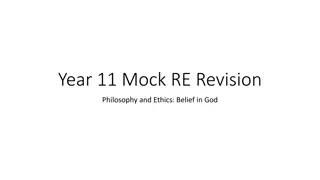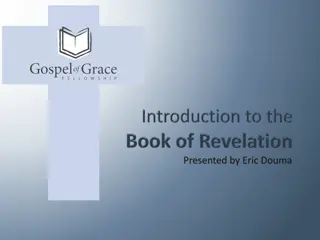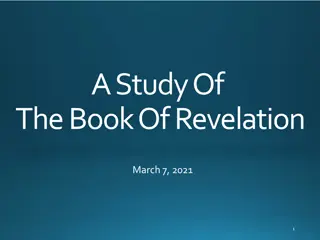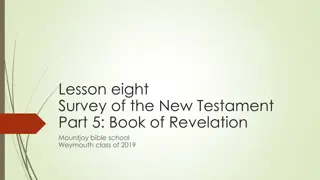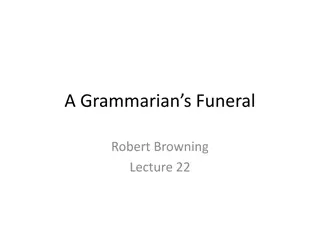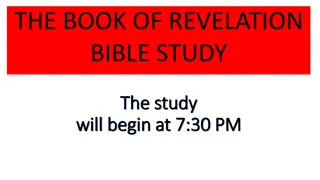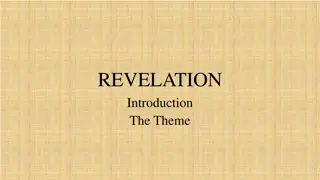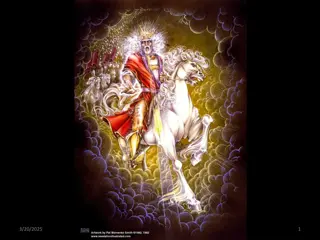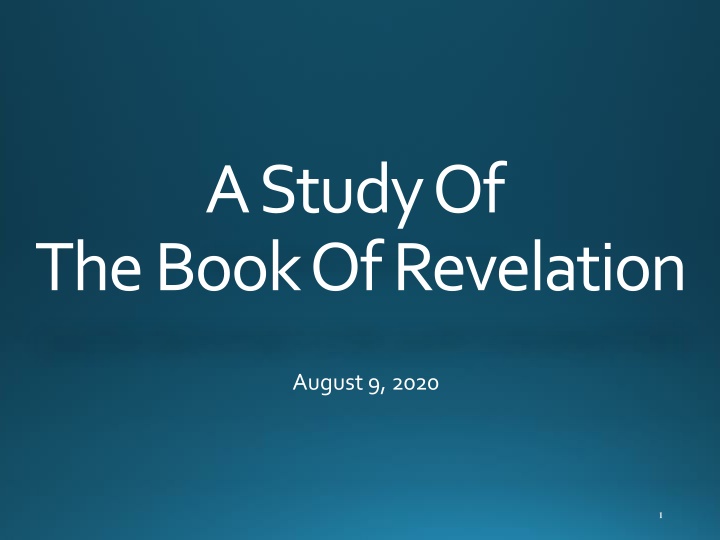
Study of the Book of Revelation: Letters to Seven Churches and the Faithful Church
Explore the insightful messages to the seven churches in Asia, their varying conditions, and the faithful church in Philadelphia. Dive into the historical background of Philadelphia, its significance, and the characteristics of the faithful church highlighted in Revelation 3:7-13. Discover the divine authority and holiness of Jesus Christ as depicted in this study.
Download Presentation

Please find below an Image/Link to download the presentation.
The content on the website is provided AS IS for your information and personal use only. It may not be sold, licensed, or shared on other websites without obtaining consent from the author. If you encounter any issues during the download, it is possible that the publisher has removed the file from their server.
You are allowed to download the files provided on this website for personal or commercial use, subject to the condition that they are used lawfully. All files are the property of their respective owners.
The content on the website is provided AS IS for your information and personal use only. It may not be sold, licensed, or shared on other websites without obtaining consent from the author.
E N D
Presentation Transcript
A Study Of The Book Of Revelation August 9, 2020 1
Letters To Seven Churches of Asia (Revelation 2-3) Some were good (Smyrna, Philadelphia) Some were good / bad (Ephesus, Pergamum, Thyatira, Sardis) One was bad (Laodicea) 2
Revelation 3:7-13 P H I L A D E L P H I A Named after King Attalus II Philadelphus, of Pergamum (159-138 BC). Named the city out of affection for his brother Ecumenus II. Agricultural town. Population of about 20,000. Missionary city for the purpose of spreading Greek culture and language. 3
Albert Barnes notes, The country, as viewed from these hills, is extremely magnificent gardens and vineyards lying at the back and sides of the town, and before it one of the most beautiful and extensive plains of Asia. Barnes, Albert, Barnes on the New Testament, Revelation Volume 11, Page 92. 5
Fleeing Philadelphia In 17AD the city, built on a fault line, was leveled by an earthquake. Philadelphia has no trustworthy walls, but daily in one direction or another they keep tottering and falling apart (Strabo, c. 63 BC - c. 21 AD) Jesus probably alludes to the history of fleeing out of the city for safety (3:12)
Revelation 3:7-13 Background / Circumstance We know nothing about the establishment or beginning of this church Faced some opposition from Jews 7
Revelation 3:7-13 A Faithful Church Revelation 3:7-13 I. The Salutation (verse 7) 8
Revelation 3:7-13 A Faithful Church Revelation 3:7-13 He who is holy This reflects His character. This indicates the authority of Jesus as deity. Jesus identifies himself with the absolute holiness of God. The same terms are applied to God in Revelation 6:10 (cf. Isaiah 6:1-5; 40:25). Christ is set forth as the ideal demanded by God of absolute separation (cf. 1 Peter 1:16) from the profane and sinful. His moral character is without spot or blemish. 1 Peter 2:21, 25. He committed no sin. Hebrews 4:15; 7:26. 9
Revelation 3:7-13 A Faithful Church Revelation 3:7-13 And True He is dependable, genuine, real He is not a false prophet. He is God s spokesman. This was a favorite expression with John. Of the 27 times this word is used in the NT, it is used 22 times by John. Jesus is the true light (John 1:9); The true bread (John 6:32); The true vine (John 15:1); The true God (1 John 5:20); and The faithful and true witness (Revelation 3:14). 10
Revelation 3:7-13 I. The Salutation (verse 7) Christ alone has the Key (singular) of David. That is the highest power and authority in the kingdom of God (Matthew 16:19; 28:18; Revelation 5:5). 1. Jesus is of the seed of David (Isaiah 9:6-7, Luke 1:30-33; Matthew 22:41-45). 2. He is raised to sit on the throne of David (Acts 2:30-33). 3. He is both Lord and Christ (Acts 2:36). 11
Revelation 3:7-13 I. The Salutation (verse 7) Christ alone has the Key (singular) of David. 4. He possesses all authority (Matthew 28:18; cf. Ephesians 1:19-23). a. Over angels and authorities and powers (1 Peter 3:22). b. Over the church (Ephesians 1:22-23). c. Over the kings of the earth (Revelation 1:5). d. Over death and Hades (Revelation 1:8). 5. Destroys the idea of Christ s reign on David s throne being future! (Jewish claims and premillennial claims.) 12
Revelation 3:7-13 I. The Salutation (verse 7) He that openeth and no man shutteth; he that shutteth and no man opens. (Revelation 3:7) 1. Jesus alone has authority to admit, to include, or exclude. 2. The Lord alone adds to the church (Acts 2:47). 3. He gives terms of entrance. (Luke 24:47; Acts 2:38; John 3:3-5; John 8:24). 4. There is no other way to enter, except that which the Lord has opened. (John 14:6; Acts 4:12). 5. He who opens who shuts Jesus ALONE has that power. 13
Revelation 3:7-13 I. The Salutation (verse 7) A. Came from David Matthew 1:1 B. Lineage of David 2 Samuel 7:12-14 C. A King like David John 18:36,37 D. Has all authority Matthew 28:18; Colossians 3:17 His character of holiness and truth is his right to kingship. Ray Summers, Worthy is the Lamb, Page 122 14
Revelation 3:7-13 A Faithful Church Revelation 3:7-13 The Salutation (verse 7) The Praise (verses 8, 10) (No condemnation in this letter.) I. II. I know thy works (behold, I have set before thee a door opened, which none can shut) This metaphor is commonly used by Paul to indicate a good opportunity for preaching the gospel (Acts 14:27; 1 Corinthians 16:8-9; 2 Corinthians 2:12; Colossians 4:3). 15
Revelation 3:7-13 A Faithful Church Revelation 3:7-13 The Salutation (verse 7) The Praise (verses 8, 10) (No condemnation in this letter.) I. II. I know thy works (behold, I have set before thee a door opened, which none can shut) Instead of spreading Greek culture the gospel to the lost is of much more importance. Were Faithful! 16
Revelation 3:7-13 The church must realize that it has an open door of service to God and man. There are many open doors : personal improvement, evangelization (2 Timothy 2:2; Matthew 9:37-38), hospitality (1 Peter 4:8-9; Hebrews 13:1-2; Acts 16:15), etc. 1. When doing the work of Christ, we must not measure only by our own human abilities, but by faith and prayer, we work the Lord s will. Ephesians 3:20-21. 2. Too often we excuse ourselves because of the obstacles we see when in reality we should be giving more credit to the strength of the Lord. 3. Abilities vary, but everyone can do something (Matthew 25:14-32) 17
Revelation 3:7-13 Thou Hast a Little Strength (power ASV) 1. Whether its power was small because of few members, limited economic status, or because of the lowly social order in which they lived, that church s power was sufficient to achieve Christ s purpose. God and one make a majority! 2. Having just one talent does not justify not using it (Matthew 25:14-30) 18
Revelation 3:7-13 Conversely, it is also an encouraging fact to realize that others may regard us as insignificant and unimportant, but the Lord knows even what the poor widow does (Mark 12:41-44; 2 Timothy 2:19). Robert Harkrider, Revelation, Page 51 19




